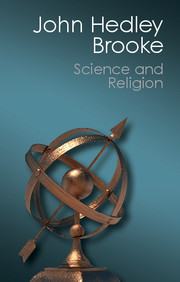Book contents
- Frontmatter
- Dedication
- Contents
- Acknowledgments
- Introduction
- I Interaction between Science and Religion: Some Preliminary Considerations
- II Science and Religion in the Scientific Revolution
- III The Parallel between Scientific and Religious Reform
- IV Divine Activity in a Mechanical Universe
- V Science and Religion in the Enlightenment
- VI The Fortunes and Functions of Natural Theology
- VII Visions of the Past: Religious Belief and the Historical Sciences
- VIII Evolutionary Theory and Religious Belief
- Postscript Science and Religion in the Twentieth Century
- Bibliographic Essay
- Sources of Quotations
- Index
I - Interaction between Science and Religion: Some Preliminary Considerations
Published online by Cambridge University Press: 05 June 2014
- Frontmatter
- Dedication
- Contents
- Acknowledgments
- Introduction
- I Interaction between Science and Religion: Some Preliminary Considerations
- II Science and Religion in the Scientific Revolution
- III The Parallel between Scientific and Religious Reform
- IV Divine Activity in a Mechanical Universe
- V Science and Religion in the Enlightenment
- VI The Fortunes and Functions of Natural Theology
- VII Visions of the Past: Religious Belief and the Historical Sciences
- VIII Evolutionary Theory and Religious Belief
- Postscript Science and Religion in the Twentieth Century
- Bibliographic Essay
- Sources of Quotations
- Index
Summary
Introduction
During their history, the natural sciences have been invested with religious meaning, with antireligious implications and, in many contexts, with no religious significance at all. The object of this book is to offer some insight into the connections that have been made between statements about nature and statements about God. As we noted in the introduction, however, problems arise as soon as one enquires about the relationship between “science” and “religion” in the past. Not only have the boundaries between them shifted with time, but to abstract them from their historical contexts can lead to artificiality as well as anachronism.
How, for example, do we deal with that late nineteenth-century evolutionist Henry Drummond, who insisted that it was wrong to speak of reconciling Christianity with evolution since the two were one? In a glowing vision of The ascent of man (1894), Drummond acknowledged the Darwinian struggle for life, but he also referred to a struggle for the life of others. The former was essential to the evolutionary process, as individuals competed for resources. But, Drummond argued, so too was the latter: Once the human mind had evolved, self-sacrifice, cooperation, and maternal love would each contribute to the survival of societies in which those virtues were encouraged. Christianity and evolution were ultimately one because both denoted a method of creation; both had as their object the making of more perfect beings. Because altruistic love was germane to both, he could argue for a perfect union. Evolution embraced progress in spirit as well as in matter.
- Type
- Chapter
- Information
- Science and ReligionSome Historical Perspectives, pp. 22 - 68Publisher: Cambridge University PressPrint publication year: 2014
- 1
- Cited by



